Information System Development Report: Travel and Tourism Analysis
VerifiedAdded on 2020/04/21
|13
|3551
|278
Report
AI Summary
This report investigates the development of information systems within the travel and tourism sector. It begins with a critical analysis of the topic, exploring the impact of technology on the industry. A key focus is the comparison between traditional brick-and-mortar business models and online web services, evaluating their functions, costs, and market reach. The report also identifies beneficiaries of the shift to online services and those who may not benefit, such as travel agents. Furthermore, it details the advantages of mobile applications, including geo-targeting, scheduling, payment ease, customer communication, and CRM support. Finally, the report addresses the security issues associated with web presence, providing a comprehensive overview of information system development in the travel and tourism industry.
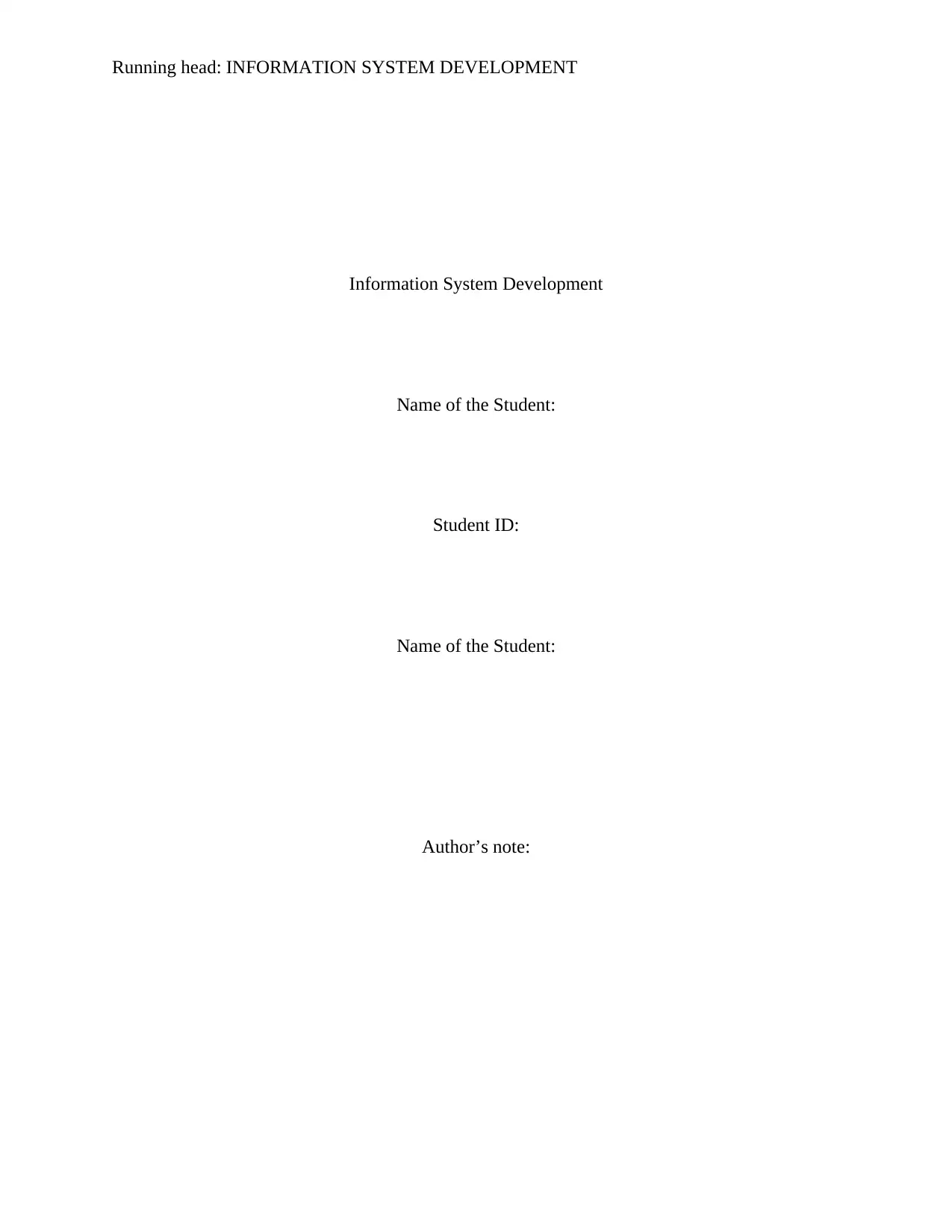
Running head: INFORMATION SYSTEM DEVELOPMENT
Information System Development
Name of the Student:
Student ID:
Name of the Student:
Author’s note:
Information System Development
Name of the Student:
Student ID:
Name of the Student:
Author’s note:
Paraphrase This Document
Need a fresh take? Get an instant paraphrase of this document with our AI Paraphraser
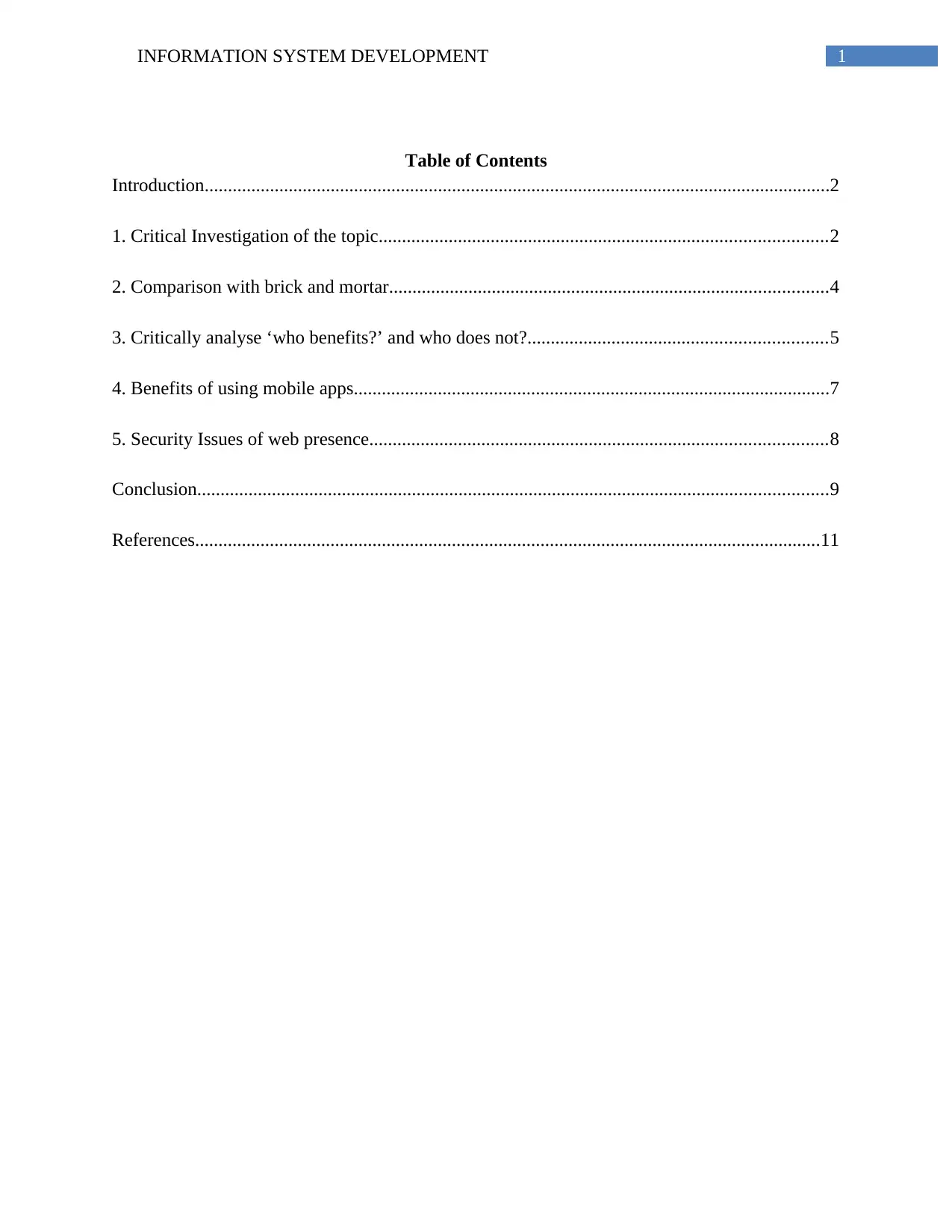
1INFORMATION SYSTEM DEVELOPMENT
Table of Contents
Introduction......................................................................................................................................2
1. Critical Investigation of the topic................................................................................................2
2. Comparison with brick and mortar..............................................................................................4
3. Critically analyse ‘who benefits?’ and who does not?................................................................5
4. Benefits of using mobile apps......................................................................................................7
5. Security Issues of web presence..................................................................................................8
Conclusion.......................................................................................................................................9
References......................................................................................................................................11
Table of Contents
Introduction......................................................................................................................................2
1. Critical Investigation of the topic................................................................................................2
2. Comparison with brick and mortar..............................................................................................4
3. Critically analyse ‘who benefits?’ and who does not?................................................................5
4. Benefits of using mobile apps......................................................................................................7
5. Security Issues of web presence..................................................................................................8
Conclusion.......................................................................................................................................9
References......................................................................................................................................11
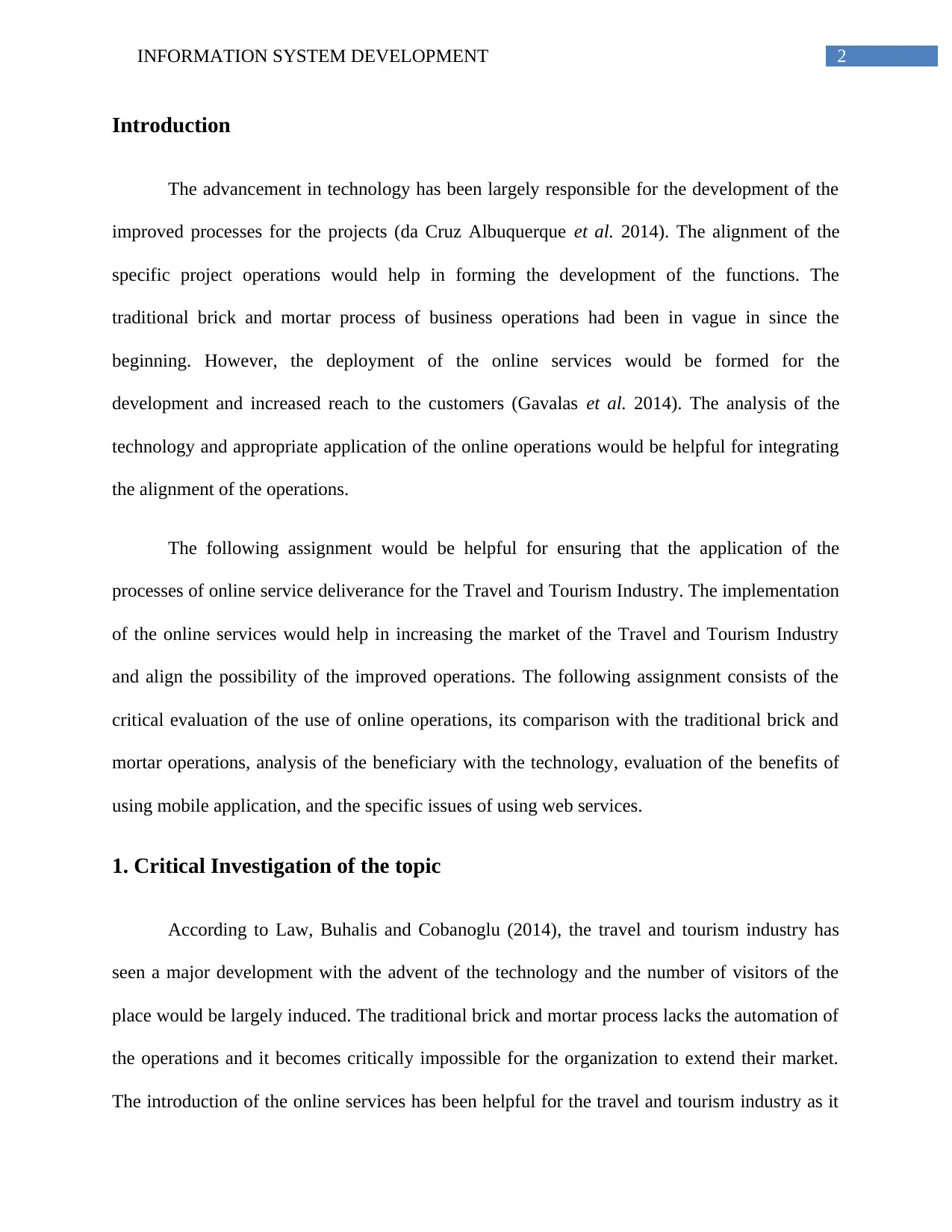
2INFORMATION SYSTEM DEVELOPMENT
Introduction
The advancement in technology has been largely responsible for the development of the
improved processes for the projects (da Cruz Albuquerque et al. 2014). The alignment of the
specific project operations would help in forming the development of the functions. The
traditional brick and mortar process of business operations had been in vague in since the
beginning. However, the deployment of the online services would be formed for the
development and increased reach to the customers (Gavalas et al. 2014). The analysis of the
technology and appropriate application of the online operations would be helpful for integrating
the alignment of the operations.
The following assignment would be helpful for ensuring that the application of the
processes of online service deliverance for the Travel and Tourism Industry. The implementation
of the online services would help in increasing the market of the Travel and Tourism Industry
and align the possibility of the improved operations. The following assignment consists of the
critical evaluation of the use of online operations, its comparison with the traditional brick and
mortar operations, analysis of the beneficiary with the technology, evaluation of the benefits of
using mobile application, and the specific issues of using web services.
1. Critical Investigation of the topic
According to Law, Buhalis and Cobanoglu (2014), the travel and tourism industry has
seen a major development with the advent of the technology and the number of visitors of the
place would be largely induced. The traditional brick and mortar process lacks the automation of
the operations and it becomes critically impossible for the organization to extend their market.
The introduction of the online services has been helpful for the travel and tourism industry as it
Introduction
The advancement in technology has been largely responsible for the development of the
improved processes for the projects (da Cruz Albuquerque et al. 2014). The alignment of the
specific project operations would help in forming the development of the functions. The
traditional brick and mortar process of business operations had been in vague in since the
beginning. However, the deployment of the online services would be formed for the
development and increased reach to the customers (Gavalas et al. 2014). The analysis of the
technology and appropriate application of the online operations would be helpful for integrating
the alignment of the operations.
The following assignment would be helpful for ensuring that the application of the
processes of online service deliverance for the Travel and Tourism Industry. The implementation
of the online services would help in increasing the market of the Travel and Tourism Industry
and align the possibility of the improved operations. The following assignment consists of the
critical evaluation of the use of online operations, its comparison with the traditional brick and
mortar operations, analysis of the beneficiary with the technology, evaluation of the benefits of
using mobile application, and the specific issues of using web services.
1. Critical Investigation of the topic
According to Law, Buhalis and Cobanoglu (2014), the travel and tourism industry has
seen a major development with the advent of the technology and the number of visitors of the
place would be largely induced. The traditional brick and mortar process lacks the automation of
the operations and it becomes critically impossible for the organization to extend their market.
The introduction of the online services has been helpful for the travel and tourism industry as it
⊘ This is a preview!⊘
Do you want full access?
Subscribe today to unlock all pages.

Trusted by 1+ million students worldwide
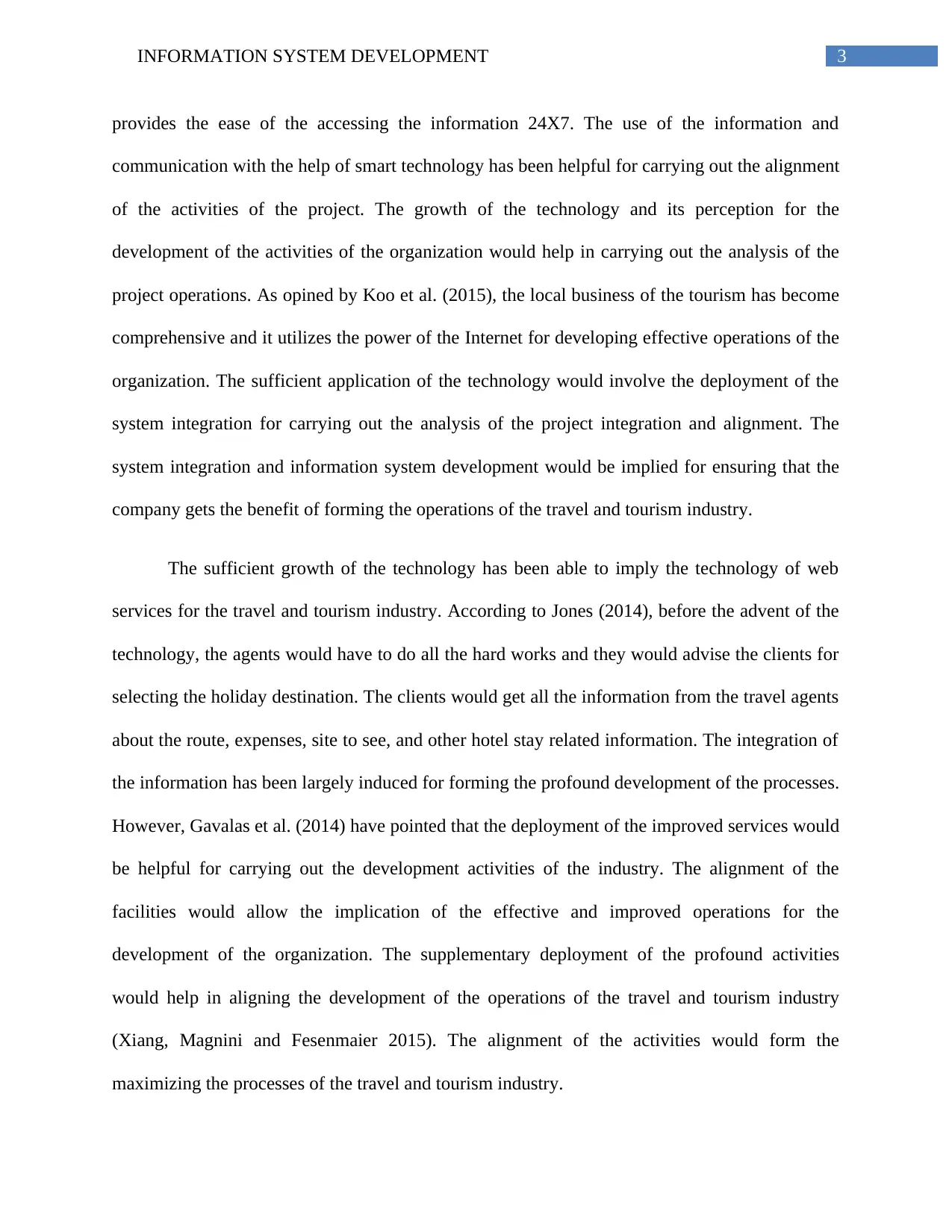
3INFORMATION SYSTEM DEVELOPMENT
provides the ease of the accessing the information 24X7. The use of the information and
communication with the help of smart technology has been helpful for carrying out the alignment
of the activities of the project. The growth of the technology and its perception for the
development of the activities of the organization would help in carrying out the analysis of the
project operations. As opined by Koo et al. (2015), the local business of the tourism has become
comprehensive and it utilizes the power of the Internet for developing effective operations of the
organization. The sufficient application of the technology would involve the deployment of the
system integration for carrying out the analysis of the project integration and alignment. The
system integration and information system development would be implied for ensuring that the
company gets the benefit of forming the operations of the travel and tourism industry.
The sufficient growth of the technology has been able to imply the technology of web
services for the travel and tourism industry. According to Jones (2014), before the advent of the
technology, the agents would have to do all the hard works and they would advise the clients for
selecting the holiday destination. The clients would get all the information from the travel agents
about the route, expenses, site to see, and other hotel stay related information. The integration of
the information has been largely induced for forming the profound development of the processes.
However, Gavalas et al. (2014) have pointed that the deployment of the improved services would
be helpful for carrying out the development activities of the industry. The alignment of the
facilities would allow the implication of the effective and improved operations for the
development of the organization. The supplementary deployment of the profound activities
would help in aligning the development of the operations of the travel and tourism industry
(Xiang, Magnini and Fesenmaier 2015). The alignment of the activities would form the
maximizing the processes of the travel and tourism industry.
provides the ease of the accessing the information 24X7. The use of the information and
communication with the help of smart technology has been helpful for carrying out the alignment
of the activities of the project. The growth of the technology and its perception for the
development of the activities of the organization would help in carrying out the analysis of the
project operations. As opined by Koo et al. (2015), the local business of the tourism has become
comprehensive and it utilizes the power of the Internet for developing effective operations of the
organization. The sufficient application of the technology would involve the deployment of the
system integration for carrying out the analysis of the project integration and alignment. The
system integration and information system development would be implied for ensuring that the
company gets the benefit of forming the operations of the travel and tourism industry.
The sufficient growth of the technology has been able to imply the technology of web
services for the travel and tourism industry. According to Jones (2014), before the advent of the
technology, the agents would have to do all the hard works and they would advise the clients for
selecting the holiday destination. The clients would get all the information from the travel agents
about the route, expenses, site to see, and other hotel stay related information. The integration of
the information has been largely induced for forming the profound development of the processes.
However, Gavalas et al. (2014) have pointed that the deployment of the improved services would
be helpful for carrying out the development activities of the industry. The alignment of the
facilities would allow the implication of the effective and improved operations for the
development of the organization. The supplementary deployment of the profound activities
would help in aligning the development of the operations of the travel and tourism industry
(Xiang, Magnini and Fesenmaier 2015). The alignment of the activities would form the
maximizing the processes of the travel and tourism industry.
Paraphrase This Document
Need a fresh take? Get an instant paraphrase of this document with our AI Paraphraser
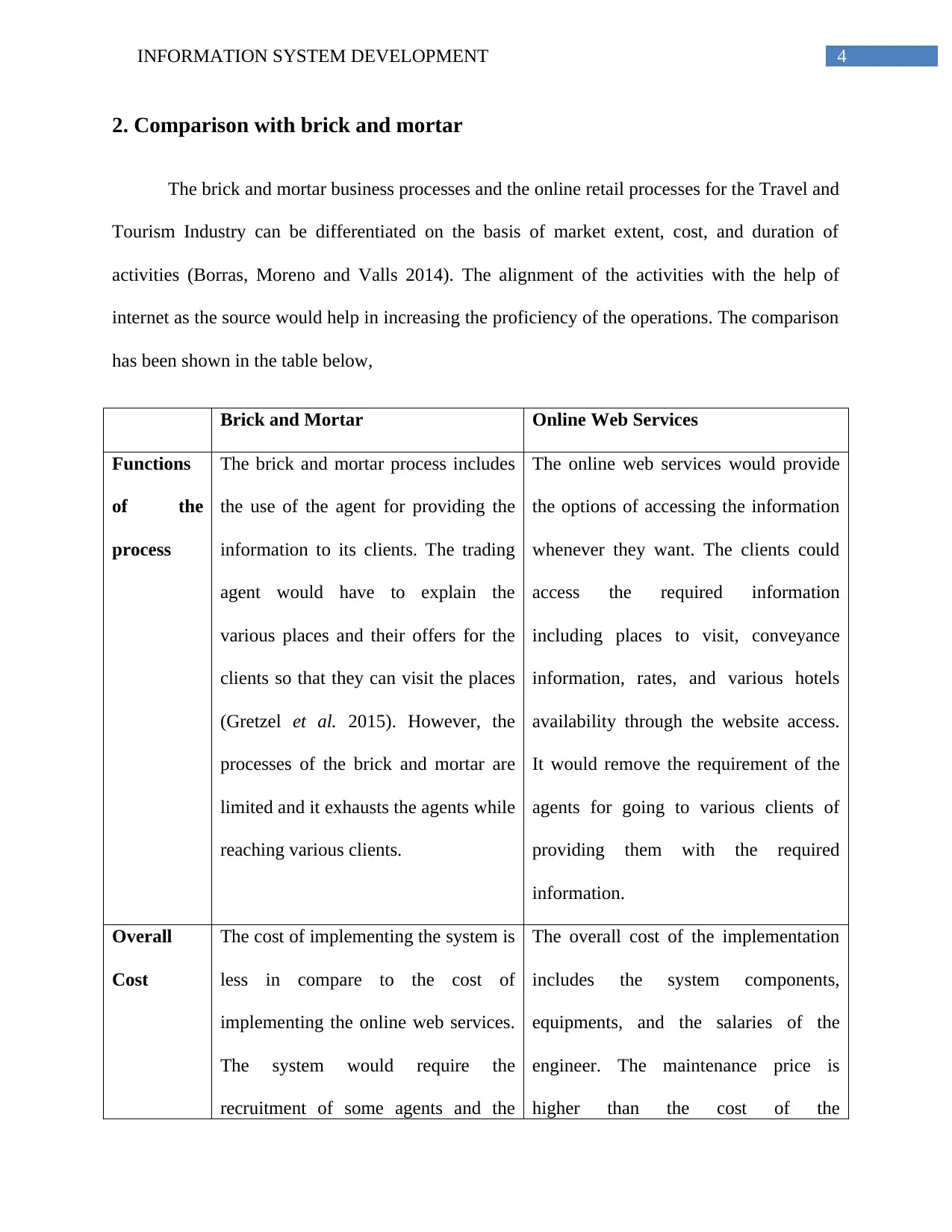
4INFORMATION SYSTEM DEVELOPMENT
2. Comparison with brick and mortar
The brick and mortar business processes and the online retail processes for the Travel and
Tourism Industry can be differentiated on the basis of market extent, cost, and duration of
activities (Borras, Moreno and Valls 2014). The alignment of the activities with the help of
internet as the source would help in increasing the proficiency of the operations. The comparison
has been shown in the table below,
Brick and Mortar Online Web Services
Functions
of the
process
The brick and mortar process includes
the use of the agent for providing the
information to its clients. The trading
agent would have to explain the
various places and their offers for the
clients so that they can visit the places
(Gretzel et al. 2015). However, the
processes of the brick and mortar are
limited and it exhausts the agents while
reaching various clients.
The online web services would provide
the options of accessing the information
whenever they want. The clients could
access the required information
including places to visit, conveyance
information, rates, and various hotels
availability through the website access.
It would remove the requirement of the
agents for going to various clients of
providing them with the required
information.
Overall
Cost
The cost of implementing the system is
less in compare to the cost of
implementing the online web services.
The system would require the
recruitment of some agents and the
The overall cost of the implementation
includes the system components,
equipments, and the salaries of the
engineer. The maintenance price is
higher than the cost of the
2. Comparison with brick and mortar
The brick and mortar business processes and the online retail processes for the Travel and
Tourism Industry can be differentiated on the basis of market extent, cost, and duration of
activities (Borras, Moreno and Valls 2014). The alignment of the activities with the help of
internet as the source would help in increasing the proficiency of the operations. The comparison
has been shown in the table below,
Brick and Mortar Online Web Services
Functions
of the
process
The brick and mortar process includes
the use of the agent for providing the
information to its clients. The trading
agent would have to explain the
various places and their offers for the
clients so that they can visit the places
(Gretzel et al. 2015). However, the
processes of the brick and mortar are
limited and it exhausts the agents while
reaching various clients.
The online web services would provide
the options of accessing the information
whenever they want. The clients could
access the required information
including places to visit, conveyance
information, rates, and various hotels
availability through the website access.
It would remove the requirement of the
agents for going to various clients of
providing them with the required
information.
Overall
Cost
The cost of implementing the system is
less in compare to the cost of
implementing the online web services.
The system would require the
recruitment of some agents and the
The overall cost of the implementation
includes the system components,
equipments, and the salaries of the
engineer. The maintenance price is
higher than the cost of the
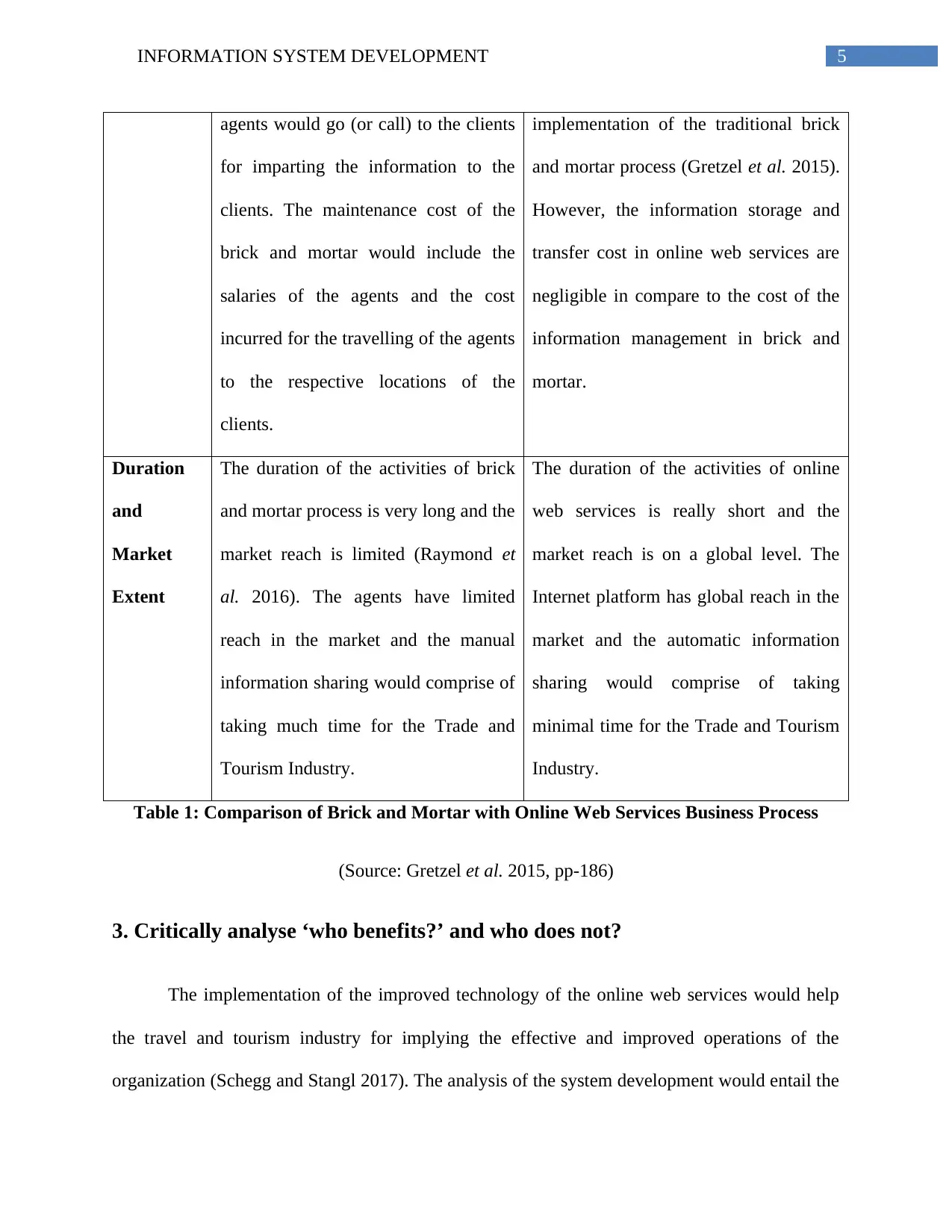
5INFORMATION SYSTEM DEVELOPMENT
agents would go (or call) to the clients
for imparting the information to the
clients. The maintenance cost of the
brick and mortar would include the
salaries of the agents and the cost
incurred for the travelling of the agents
to the respective locations of the
clients.
implementation of the traditional brick
and mortar process (Gretzel et al. 2015).
However, the information storage and
transfer cost in online web services are
negligible in compare to the cost of the
information management in brick and
mortar.
Duration
and
Market
Extent
The duration of the activities of brick
and mortar process is very long and the
market reach is limited (Raymond et
al. 2016). The agents have limited
reach in the market and the manual
information sharing would comprise of
taking much time for the Trade and
Tourism Industry.
The duration of the activities of online
web services is really short and the
market reach is on a global level. The
Internet platform has global reach in the
market and the automatic information
sharing would comprise of taking
minimal time for the Trade and Tourism
Industry.
Table 1: Comparison of Brick and Mortar with Online Web Services Business Process
(Source: Gretzel et al. 2015, pp-186)
3. Critically analyse ‘who benefits?’ and who does not?
The implementation of the improved technology of the online web services would help
the travel and tourism industry for implying the effective and improved operations of the
organization (Schegg and Stangl 2017). The analysis of the system development would entail the
agents would go (or call) to the clients
for imparting the information to the
clients. The maintenance cost of the
brick and mortar would include the
salaries of the agents and the cost
incurred for the travelling of the agents
to the respective locations of the
clients.
implementation of the traditional brick
and mortar process (Gretzel et al. 2015).
However, the information storage and
transfer cost in online web services are
negligible in compare to the cost of the
information management in brick and
mortar.
Duration
and
Market
Extent
The duration of the activities of brick
and mortar process is very long and the
market reach is limited (Raymond et
al. 2016). The agents have limited
reach in the market and the manual
information sharing would comprise of
taking much time for the Trade and
Tourism Industry.
The duration of the activities of online
web services is really short and the
market reach is on a global level. The
Internet platform has global reach in the
market and the automatic information
sharing would comprise of taking
minimal time for the Trade and Tourism
Industry.
Table 1: Comparison of Brick and Mortar with Online Web Services Business Process
(Source: Gretzel et al. 2015, pp-186)
3. Critically analyse ‘who benefits?’ and who does not?
The implementation of the improved technology of the online web services would help
the travel and tourism industry for implying the effective and improved operations of the
organization (Schegg and Stangl 2017). The analysis of the system development would entail the
⊘ This is a preview!⊘
Do you want full access?
Subscribe today to unlock all pages.

Trusted by 1+ million students worldwide
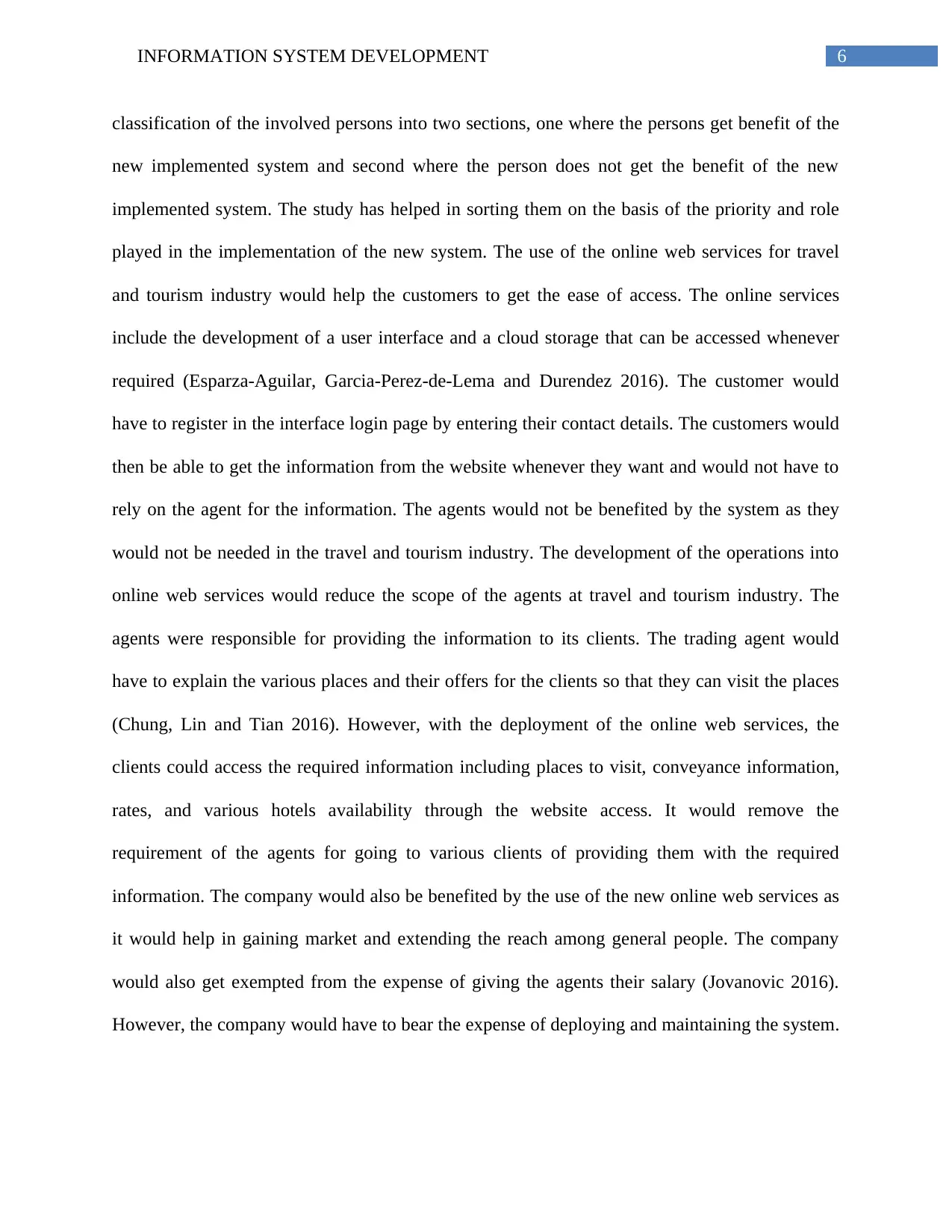
6INFORMATION SYSTEM DEVELOPMENT
classification of the involved persons into two sections, one where the persons get benefit of the
new implemented system and second where the person does not get the benefit of the new
implemented system. The study has helped in sorting them on the basis of the priority and role
played in the implementation of the new system. The use of the online web services for travel
and tourism industry would help the customers to get the ease of access. The online services
include the development of a user interface and a cloud storage that can be accessed whenever
required (Esparza-Aguilar, Garcia-Perez-de-Lema and Durendez 2016). The customer would
have to register in the interface login page by entering their contact details. The customers would
then be able to get the information from the website whenever they want and would not have to
rely on the agent for the information. The agents would not be benefited by the system as they
would not be needed in the travel and tourism industry. The development of the operations into
online web services would reduce the scope of the agents at travel and tourism industry. The
agents were responsible for providing the information to its clients. The trading agent would
have to explain the various places and their offers for the clients so that they can visit the places
(Chung, Lin and Tian 2016). However, with the deployment of the online web services, the
clients could access the required information including places to visit, conveyance information,
rates, and various hotels availability through the website access. It would remove the
requirement of the agents for going to various clients of providing them with the required
information. The company would also be benefited by the use of the new online web services as
it would help in gaining market and extending the reach among general people. The company
would also get exempted from the expense of giving the agents their salary (Jovanovic 2016).
However, the company would have to bear the expense of deploying and maintaining the system.
classification of the involved persons into two sections, one where the persons get benefit of the
new implemented system and second where the person does not get the benefit of the new
implemented system. The study has helped in sorting them on the basis of the priority and role
played in the implementation of the new system. The use of the online web services for travel
and tourism industry would help the customers to get the ease of access. The online services
include the development of a user interface and a cloud storage that can be accessed whenever
required (Esparza-Aguilar, Garcia-Perez-de-Lema and Durendez 2016). The customer would
have to register in the interface login page by entering their contact details. The customers would
then be able to get the information from the website whenever they want and would not have to
rely on the agent for the information. The agents would not be benefited by the system as they
would not be needed in the travel and tourism industry. The development of the operations into
online web services would reduce the scope of the agents at travel and tourism industry. The
agents were responsible for providing the information to its clients. The trading agent would
have to explain the various places and their offers for the clients so that they can visit the places
(Chung, Lin and Tian 2016). However, with the deployment of the online web services, the
clients could access the required information including places to visit, conveyance information,
rates, and various hotels availability through the website access. It would remove the
requirement of the agents for going to various clients of providing them with the required
information. The company would also be benefited by the use of the new online web services as
it would help in gaining market and extending the reach among general people. The company
would also get exempted from the expense of giving the agents their salary (Jovanovic 2016).
However, the company would have to bear the expense of deploying and maintaining the system.
Paraphrase This Document
Need a fresh take? Get an instant paraphrase of this document with our AI Paraphraser
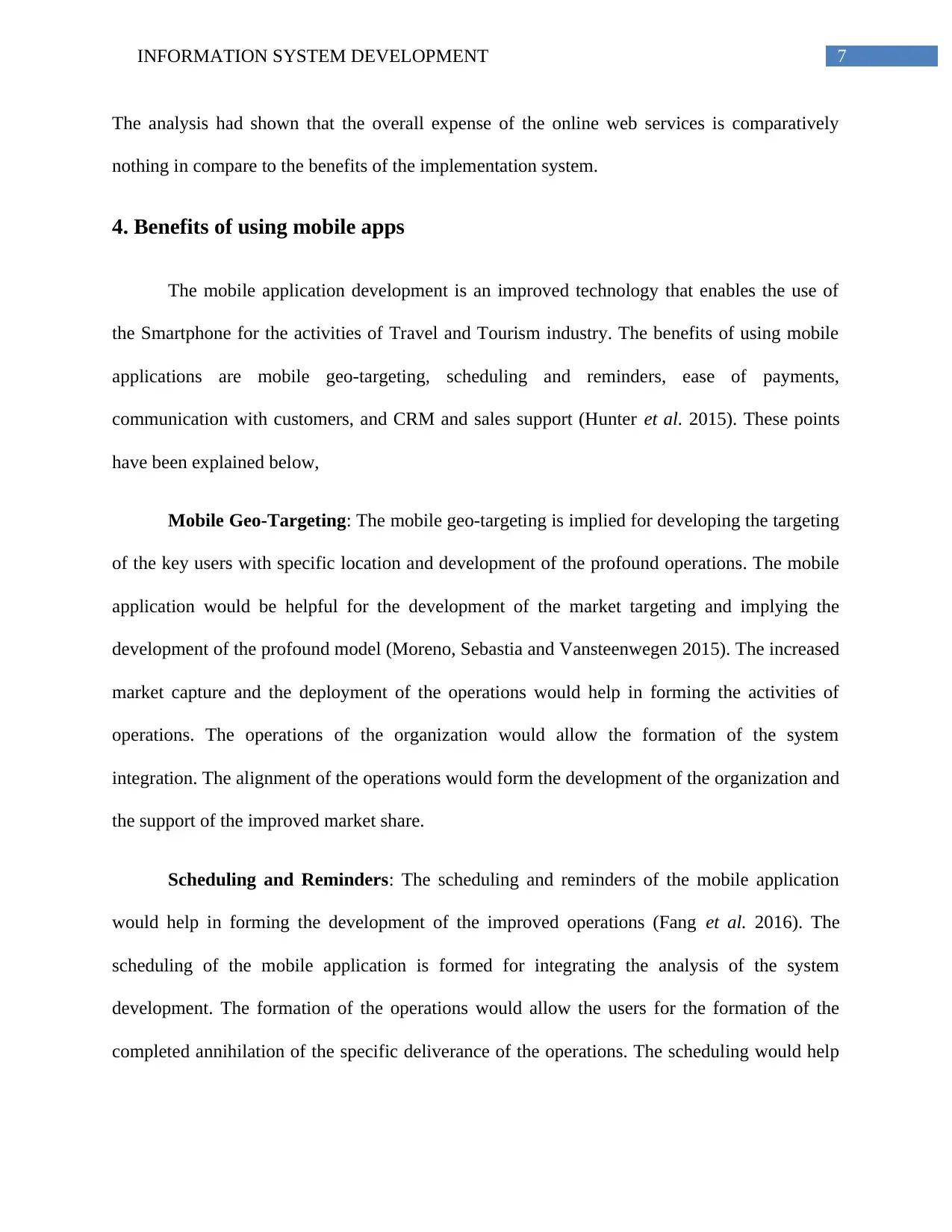
7INFORMATION SYSTEM DEVELOPMENT
The analysis had shown that the overall expense of the online web services is comparatively
nothing in compare to the benefits of the implementation system.
4. Benefits of using mobile apps
The mobile application development is an improved technology that enables the use of
the Smartphone for the activities of Travel and Tourism industry. The benefits of using mobile
applications are mobile geo-targeting, scheduling and reminders, ease of payments,
communication with customers, and CRM and sales support (Hunter et al. 2015). These points
have been explained below,
Mobile Geo-Targeting: The mobile geo-targeting is implied for developing the targeting
of the key users with specific location and development of the profound operations. The mobile
application would be helpful for the development of the market targeting and implying the
development of the profound model (Moreno, Sebastia and Vansteenwegen 2015). The increased
market capture and the deployment of the operations would help in forming the activities of
operations. The operations of the organization would allow the formation of the system
integration. The alignment of the operations would form the development of the organization and
the support of the improved market share.
Scheduling and Reminders: The scheduling and reminders of the mobile application
would help in forming the development of the improved operations (Fang et al. 2016). The
scheduling of the mobile application is formed for integrating the analysis of the system
development. The formation of the operations would allow the users for the formation of the
completed annihilation of the specific deliverance of the operations. The scheduling would help
The analysis had shown that the overall expense of the online web services is comparatively
nothing in compare to the benefits of the implementation system.
4. Benefits of using mobile apps
The mobile application development is an improved technology that enables the use of
the Smartphone for the activities of Travel and Tourism industry. The benefits of using mobile
applications are mobile geo-targeting, scheduling and reminders, ease of payments,
communication with customers, and CRM and sales support (Hunter et al. 2015). These points
have been explained below,
Mobile Geo-Targeting: The mobile geo-targeting is implied for developing the targeting
of the key users with specific location and development of the profound operations. The mobile
application would be helpful for the development of the market targeting and implying the
development of the profound model (Moreno, Sebastia and Vansteenwegen 2015). The increased
market capture and the deployment of the operations would help in forming the activities of
operations. The operations of the organization would allow the formation of the system
integration. The alignment of the operations would form the development of the organization and
the support of the improved market share.
Scheduling and Reminders: The scheduling and reminders of the mobile application
would help in forming the development of the improved operations (Fang et al. 2016). The
scheduling of the mobile application is formed for integrating the analysis of the system
development. The formation of the operations would allow the users for the formation of the
completed annihilation of the specific deliverance of the operations. The scheduling would help
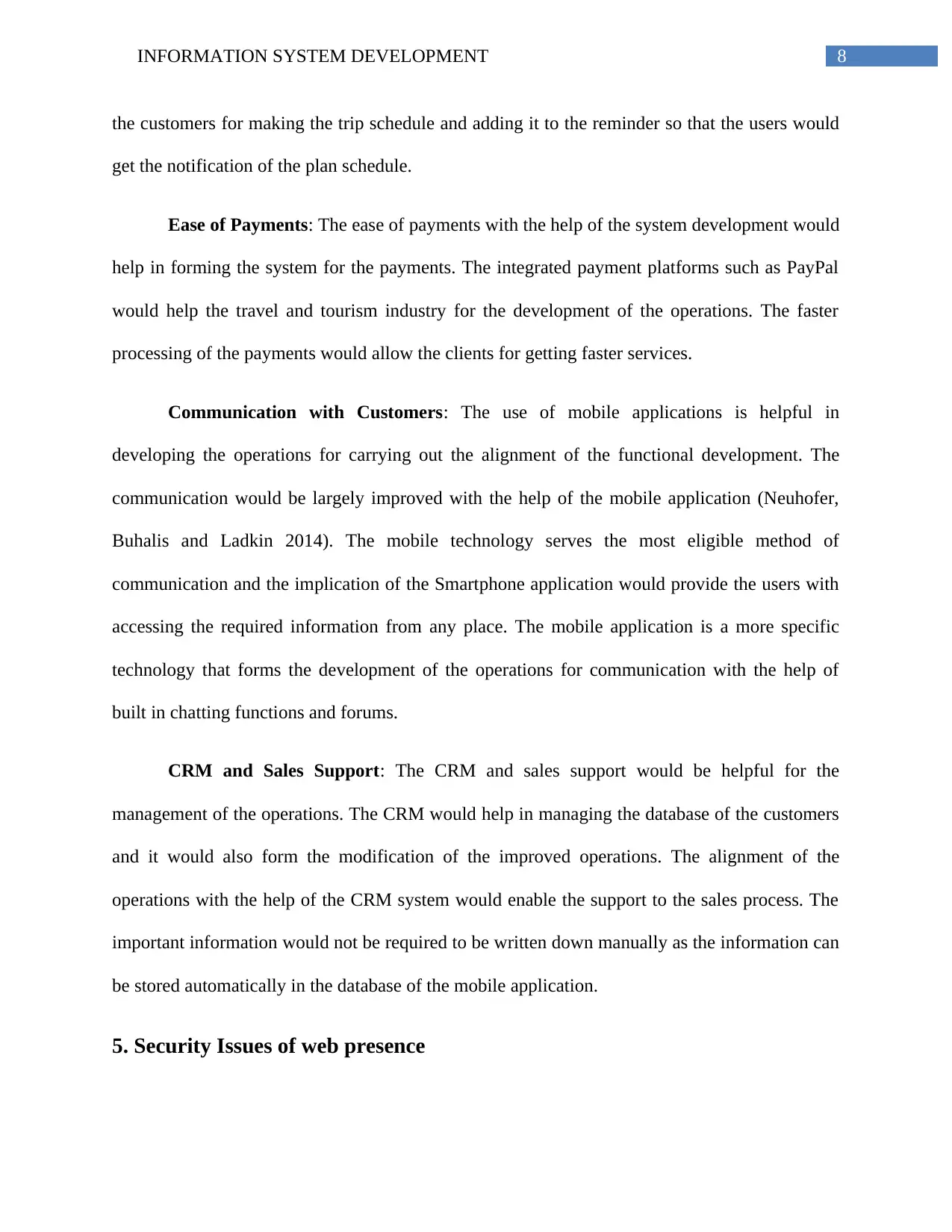
8INFORMATION SYSTEM DEVELOPMENT
the customers for making the trip schedule and adding it to the reminder so that the users would
get the notification of the plan schedule.
Ease of Payments: The ease of payments with the help of the system development would
help in forming the system for the payments. The integrated payment platforms such as PayPal
would help the travel and tourism industry for the development of the operations. The faster
processing of the payments would allow the clients for getting faster services.
Communication with Customers: The use of mobile applications is helpful in
developing the operations for carrying out the alignment of the functional development. The
communication would be largely improved with the help of the mobile application (Neuhofer,
Buhalis and Ladkin 2014). The mobile technology serves the most eligible method of
communication and the implication of the Smartphone application would provide the users with
accessing the required information from any place. The mobile application is a more specific
technology that forms the development of the operations for communication with the help of
built in chatting functions and forums.
CRM and Sales Support: The CRM and sales support would be helpful for the
management of the operations. The CRM would help in managing the database of the customers
and it would also form the modification of the improved operations. The alignment of the
operations with the help of the CRM system would enable the support to the sales process. The
important information would not be required to be written down manually as the information can
be stored automatically in the database of the mobile application.
5. Security Issues of web presence
the customers for making the trip schedule and adding it to the reminder so that the users would
get the notification of the plan schedule.
Ease of Payments: The ease of payments with the help of the system development would
help in forming the system for the payments. The integrated payment platforms such as PayPal
would help the travel and tourism industry for the development of the operations. The faster
processing of the payments would allow the clients for getting faster services.
Communication with Customers: The use of mobile applications is helpful in
developing the operations for carrying out the alignment of the functional development. The
communication would be largely improved with the help of the mobile application (Neuhofer,
Buhalis and Ladkin 2014). The mobile technology serves the most eligible method of
communication and the implication of the Smartphone application would provide the users with
accessing the required information from any place. The mobile application is a more specific
technology that forms the development of the operations for communication with the help of
built in chatting functions and forums.
CRM and Sales Support: The CRM and sales support would be helpful for the
management of the operations. The CRM would help in managing the database of the customers
and it would also form the modification of the improved operations. The alignment of the
operations with the help of the CRM system would enable the support to the sales process. The
important information would not be required to be written down manually as the information can
be stored automatically in the database of the mobile application.
5. Security Issues of web presence
⊘ This is a preview!⊘
Do you want full access?
Subscribe today to unlock all pages.

Trusted by 1+ million students worldwide
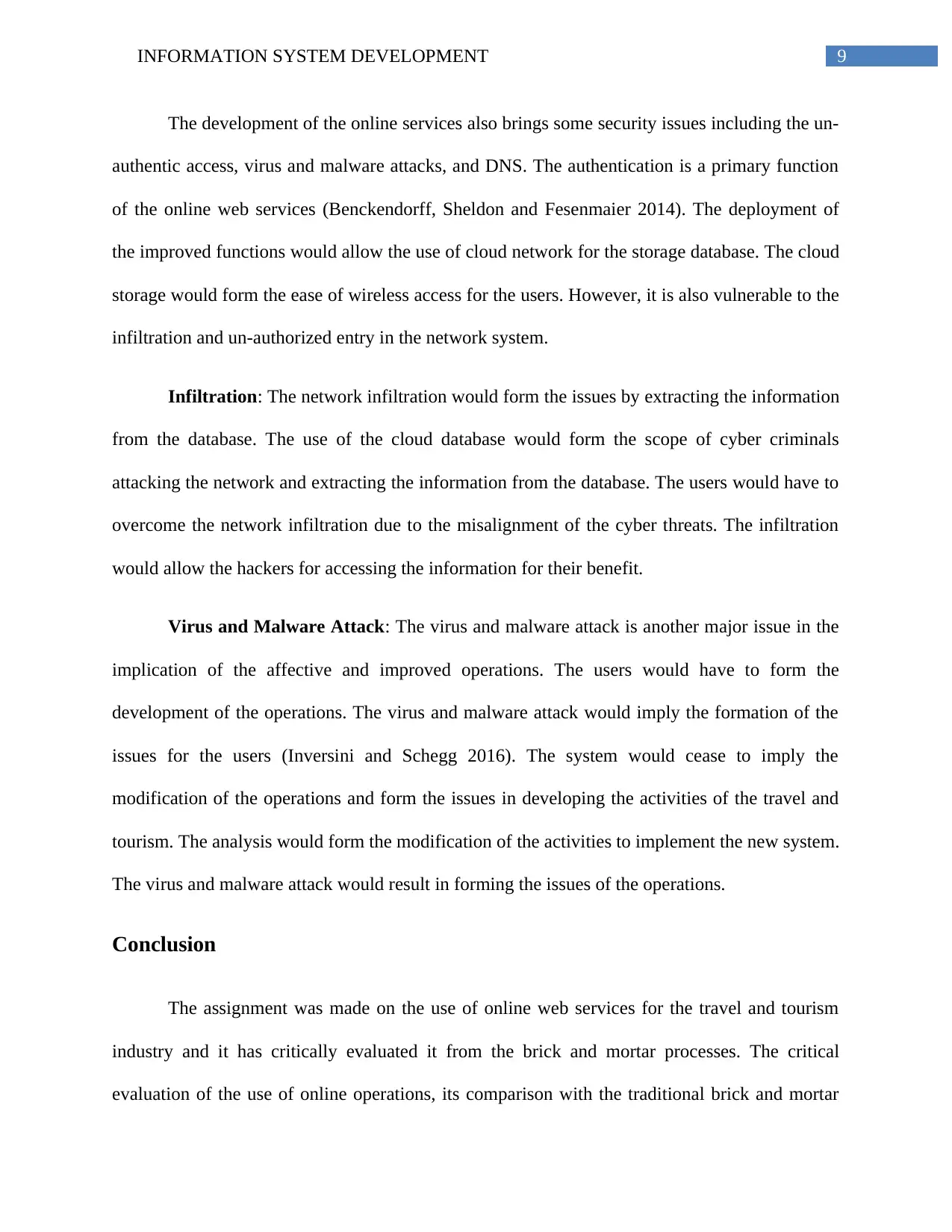
9INFORMATION SYSTEM DEVELOPMENT
The development of the online services also brings some security issues including the un-
authentic access, virus and malware attacks, and DNS. The authentication is a primary function
of the online web services (Benckendorff, Sheldon and Fesenmaier 2014). The deployment of
the improved functions would allow the use of cloud network for the storage database. The cloud
storage would form the ease of wireless access for the users. However, it is also vulnerable to the
infiltration and un-authorized entry in the network system.
Infiltration: The network infiltration would form the issues by extracting the information
from the database. The use of the cloud database would form the scope of cyber criminals
attacking the network and extracting the information from the database. The users would have to
overcome the network infiltration due to the misalignment of the cyber threats. The infiltration
would allow the hackers for accessing the information for their benefit.
Virus and Malware Attack: The virus and malware attack is another major issue in the
implication of the affective and improved operations. The users would have to form the
development of the operations. The virus and malware attack would imply the formation of the
issues for the users (Inversini and Schegg 2016). The system would cease to imply the
modification of the operations and form the issues in developing the activities of the travel and
tourism. The analysis would form the modification of the activities to implement the new system.
The virus and malware attack would result in forming the issues of the operations.
Conclusion
The assignment was made on the use of online web services for the travel and tourism
industry and it has critically evaluated it from the brick and mortar processes. The critical
evaluation of the use of online operations, its comparison with the traditional brick and mortar
The development of the online services also brings some security issues including the un-
authentic access, virus and malware attacks, and DNS. The authentication is a primary function
of the online web services (Benckendorff, Sheldon and Fesenmaier 2014). The deployment of
the improved functions would allow the use of cloud network for the storage database. The cloud
storage would form the ease of wireless access for the users. However, it is also vulnerable to the
infiltration and un-authorized entry in the network system.
Infiltration: The network infiltration would form the issues by extracting the information
from the database. The use of the cloud database would form the scope of cyber criminals
attacking the network and extracting the information from the database. The users would have to
overcome the network infiltration due to the misalignment of the cyber threats. The infiltration
would allow the hackers for accessing the information for their benefit.
Virus and Malware Attack: The virus and malware attack is another major issue in the
implication of the affective and improved operations. The users would have to form the
development of the operations. The virus and malware attack would imply the formation of the
issues for the users (Inversini and Schegg 2016). The system would cease to imply the
modification of the operations and form the issues in developing the activities of the travel and
tourism. The analysis would form the modification of the activities to implement the new system.
The virus and malware attack would result in forming the issues of the operations.
Conclusion
The assignment was made on the use of online web services for the travel and tourism
industry and it has critically evaluated it from the brick and mortar processes. The critical
evaluation of the use of online operations, its comparison with the traditional brick and mortar
Paraphrase This Document
Need a fresh take? Get an instant paraphrase of this document with our AI Paraphraser
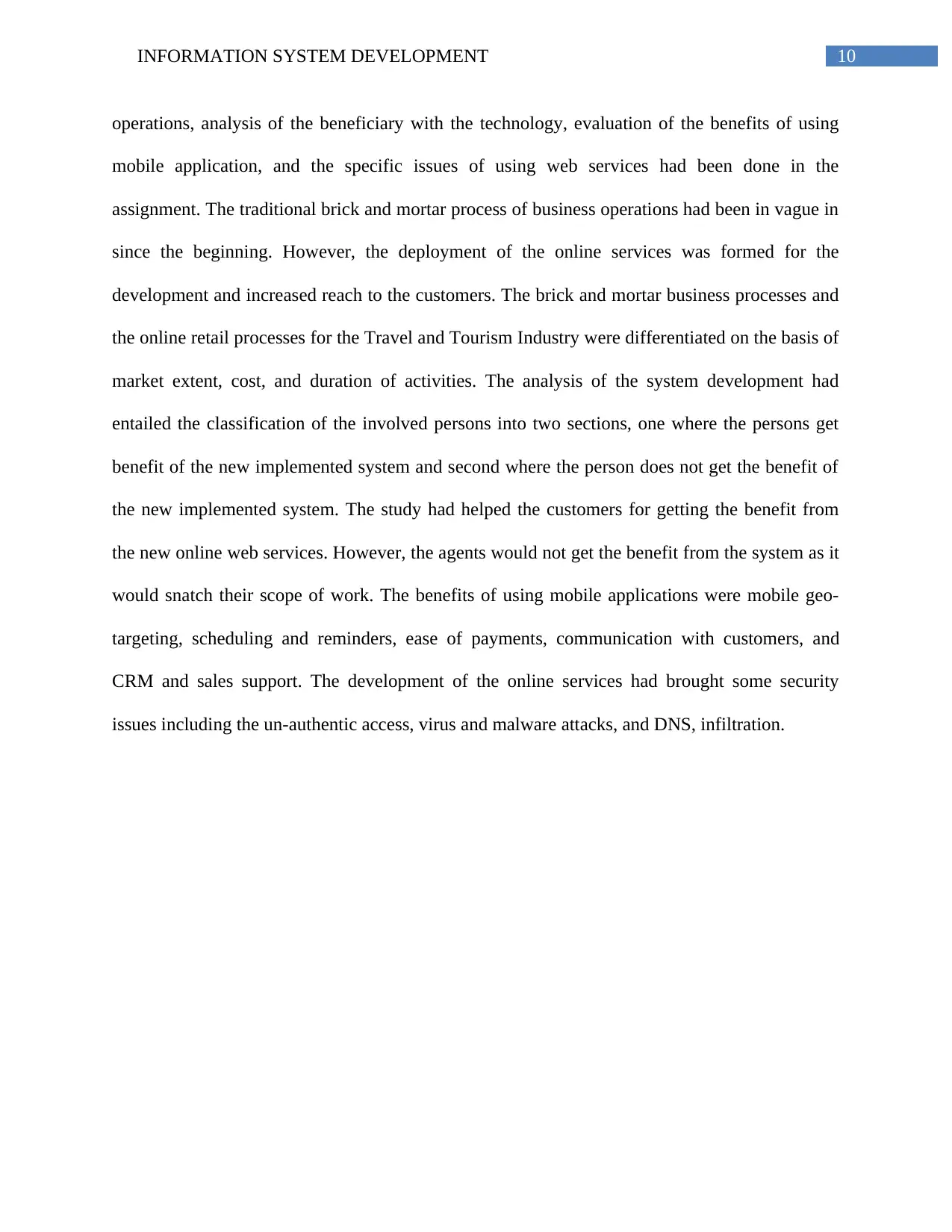
10INFORMATION SYSTEM DEVELOPMENT
operations, analysis of the beneficiary with the technology, evaluation of the benefits of using
mobile application, and the specific issues of using web services had been done in the
assignment. The traditional brick and mortar process of business operations had been in vague in
since the beginning. However, the deployment of the online services was formed for the
development and increased reach to the customers. The brick and mortar business processes and
the online retail processes for the Travel and Tourism Industry were differentiated on the basis of
market extent, cost, and duration of activities. The analysis of the system development had
entailed the classification of the involved persons into two sections, one where the persons get
benefit of the new implemented system and second where the person does not get the benefit of
the new implemented system. The study had helped the customers for getting the benefit from
the new online web services. However, the agents would not get the benefit from the system as it
would snatch their scope of work. The benefits of using mobile applications were mobile geo-
targeting, scheduling and reminders, ease of payments, communication with customers, and
CRM and sales support. The development of the online services had brought some security
issues including the un-authentic access, virus and malware attacks, and DNS, infiltration.
operations, analysis of the beneficiary with the technology, evaluation of the benefits of using
mobile application, and the specific issues of using web services had been done in the
assignment. The traditional brick and mortar process of business operations had been in vague in
since the beginning. However, the deployment of the online services was formed for the
development and increased reach to the customers. The brick and mortar business processes and
the online retail processes for the Travel and Tourism Industry were differentiated on the basis of
market extent, cost, and duration of activities. The analysis of the system development had
entailed the classification of the involved persons into two sections, one where the persons get
benefit of the new implemented system and second where the person does not get the benefit of
the new implemented system. The study had helped the customers for getting the benefit from
the new online web services. However, the agents would not get the benefit from the system as it
would snatch their scope of work. The benefits of using mobile applications were mobile geo-
targeting, scheduling and reminders, ease of payments, communication with customers, and
CRM and sales support. The development of the online services had brought some security
issues including the un-authentic access, virus and malware attacks, and DNS, infiltration.
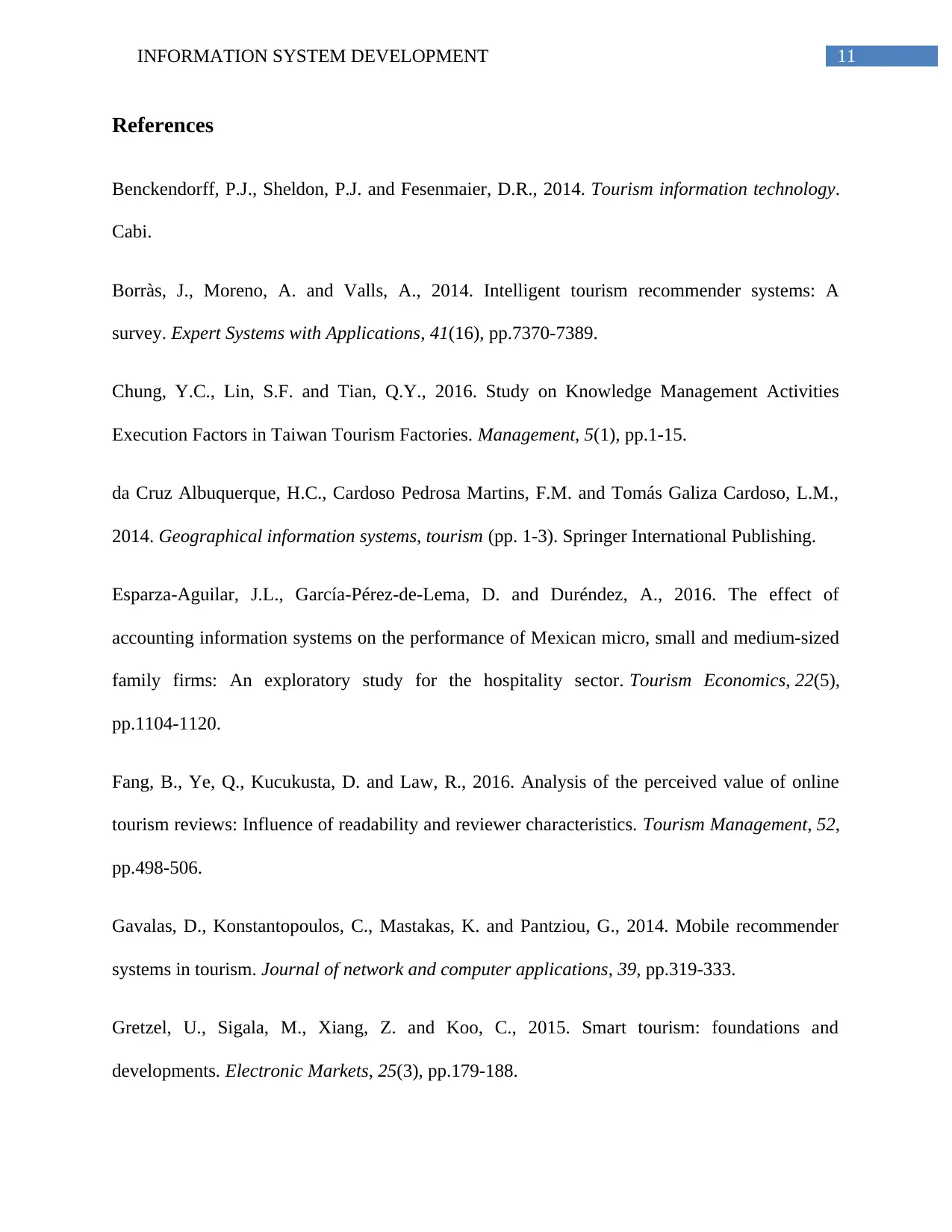
11INFORMATION SYSTEM DEVELOPMENT
References
Benckendorff, P.J., Sheldon, P.J. and Fesenmaier, D.R., 2014. Tourism information technology.
Cabi.
Borràs, J., Moreno, A. and Valls, A., 2014. Intelligent tourism recommender systems: A
survey. Expert Systems with Applications, 41(16), pp.7370-7389.
Chung, Y.C., Lin, S.F. and Tian, Q.Y., 2016. Study on Knowledge Management Activities
Execution Factors in Taiwan Tourism Factories. Management, 5(1), pp.1-15.
da Cruz Albuquerque, H.C., Cardoso Pedrosa Martins, F.M. and Tomás Galiza Cardoso, L.M.,
2014. Geographical information systems, tourism (pp. 1-3). Springer International Publishing.
Esparza-Aguilar, J.L., García-Pérez-de-Lema, D. and Duréndez, A., 2016. The effect of
accounting information systems on the performance of Mexican micro, small and medium-sized
family firms: An exploratory study for the hospitality sector. Tourism Economics, 22(5),
pp.1104-1120.
Fang, B., Ye, Q., Kucukusta, D. and Law, R., 2016. Analysis of the perceived value of online
tourism reviews: Influence of readability and reviewer characteristics. Tourism Management, 52,
pp.498-506.
Gavalas, D., Konstantopoulos, C., Mastakas, K. and Pantziou, G., 2014. Mobile recommender
systems in tourism. Journal of network and computer applications, 39, pp.319-333.
Gretzel, U., Sigala, M., Xiang, Z. and Koo, C., 2015. Smart tourism: foundations and
developments. Electronic Markets, 25(3), pp.179-188.
References
Benckendorff, P.J., Sheldon, P.J. and Fesenmaier, D.R., 2014. Tourism information technology.
Cabi.
Borràs, J., Moreno, A. and Valls, A., 2014. Intelligent tourism recommender systems: A
survey. Expert Systems with Applications, 41(16), pp.7370-7389.
Chung, Y.C., Lin, S.F. and Tian, Q.Y., 2016. Study on Knowledge Management Activities
Execution Factors in Taiwan Tourism Factories. Management, 5(1), pp.1-15.
da Cruz Albuquerque, H.C., Cardoso Pedrosa Martins, F.M. and Tomás Galiza Cardoso, L.M.,
2014. Geographical information systems, tourism (pp. 1-3). Springer International Publishing.
Esparza-Aguilar, J.L., García-Pérez-de-Lema, D. and Duréndez, A., 2016. The effect of
accounting information systems on the performance of Mexican micro, small and medium-sized
family firms: An exploratory study for the hospitality sector. Tourism Economics, 22(5),
pp.1104-1120.
Fang, B., Ye, Q., Kucukusta, D. and Law, R., 2016. Analysis of the perceived value of online
tourism reviews: Influence of readability and reviewer characteristics. Tourism Management, 52,
pp.498-506.
Gavalas, D., Konstantopoulos, C., Mastakas, K. and Pantziou, G., 2014. Mobile recommender
systems in tourism. Journal of network and computer applications, 39, pp.319-333.
Gretzel, U., Sigala, M., Xiang, Z. and Koo, C., 2015. Smart tourism: foundations and
developments. Electronic Markets, 25(3), pp.179-188.
⊘ This is a preview!⊘
Do you want full access?
Subscribe today to unlock all pages.

Trusted by 1+ million students worldwide
1 out of 13
Related Documents
Your All-in-One AI-Powered Toolkit for Academic Success.
+13062052269
info@desklib.com
Available 24*7 on WhatsApp / Email
![[object Object]](/_next/static/media/star-bottom.7253800d.svg)
Unlock your academic potential
Copyright © 2020–2026 A2Z Services. All Rights Reserved. Developed and managed by ZUCOL.





